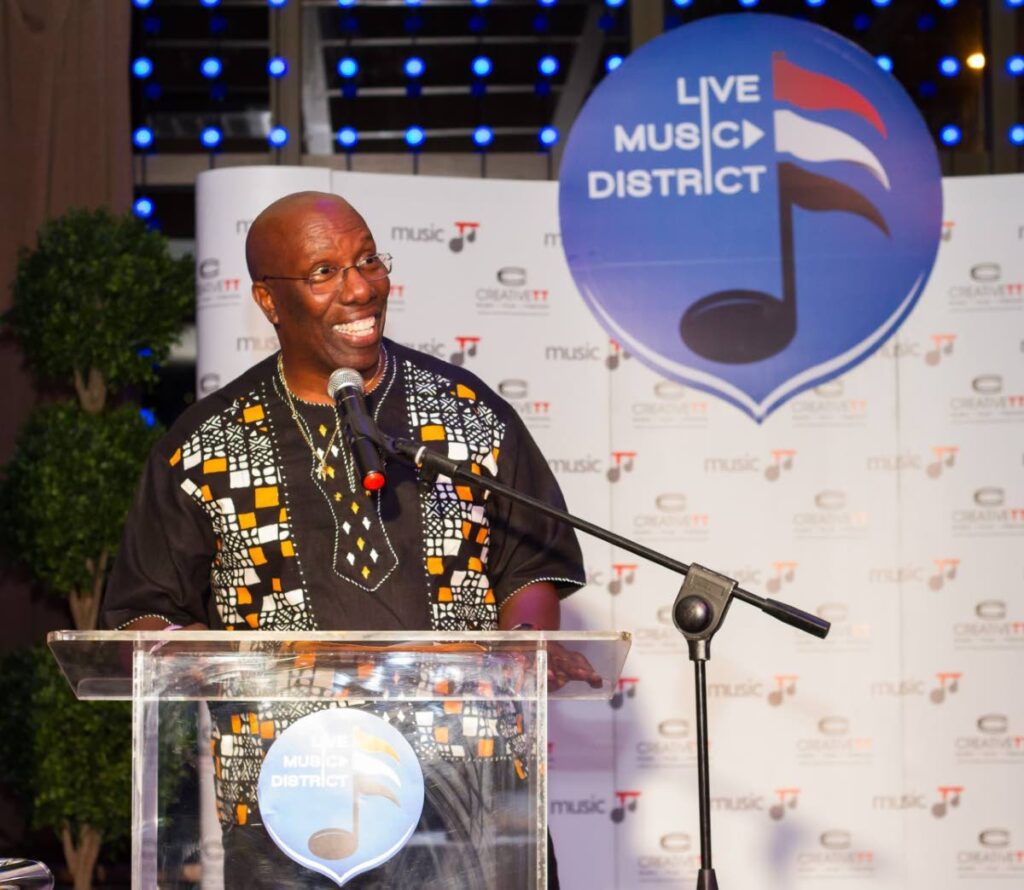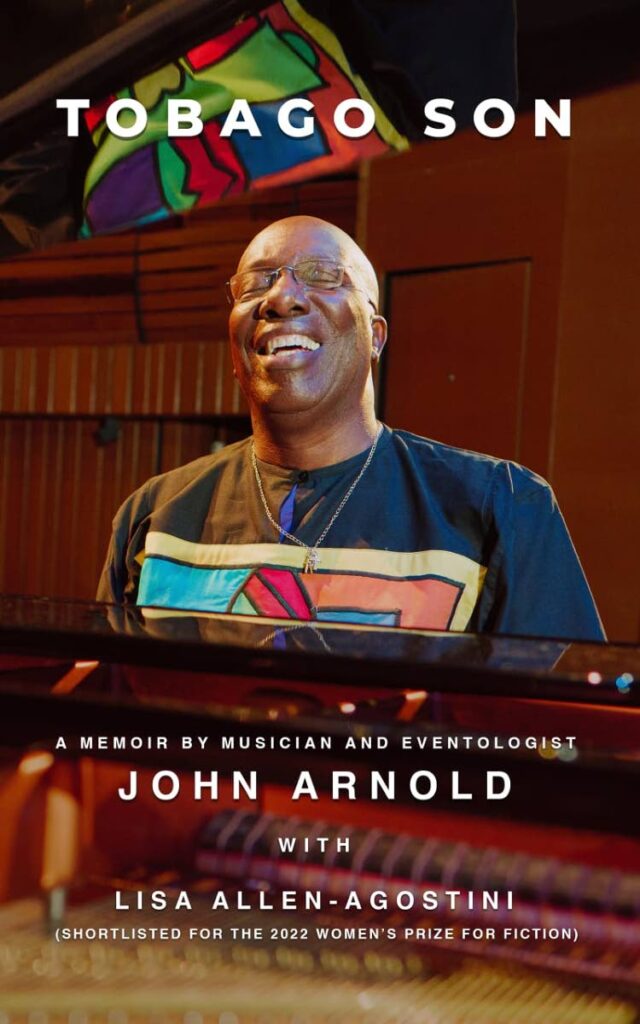Tobago's son: Memoir celebrates John Arnold's life in music, eventology

WITH over 30 years in the fields of music, education and eventology, John Arnold is one of Tobago’s most celebrated sons.
He was awarded the Hummingbird medal (gold) for culture and the arts at the 2011 national awards and remains a leading figure within the island’s creative fraternity.
Now, Arnold’s work as a pioneer, lobbyist and visionary is contained in his memoir, A Tobago Son: A memoir of musician and eventologist John Arnold, which is being launched on November 17, at Kariwak Village, Crown Point, from 5 pm.
Several key speakers are expected to address the guests and Arnold will also read excerpts from the memoir. There will be live entertainment from Lynette Louis.
On November 18, Arnold will promote the publication at the National Library in Port of Spain from 5.30 pm.
A Tobago Son: A memoir of musician and eventologist John Arnold is already available on Kindle and Amazon.
Written by well-known author and journalist Lisa Allen-Agostini, the ten-chapter memoir takes a deeply personal look at the experiences and influences that shaped Arnold’s life, dating back to his tough childhood in Bethel and culminating with his reputation as one of Tobago’s cultural luminaries.
It is Arnold’s second publication. In 2007, he published a songbook, titled Carry em go Long, containing 33 of Tobago’s folk songs.
In a Sunday Newsday interview on Wednesday, Arnold, 64, said, “It is really a book that traces my childhood in the context of why I am the way I am now. It looks at the impact of school on me as a musician and events person. When the reader goes through it, they will realise that my whole life has been influenced by these two main things.”
Some chapters, he said, are dedicated to landmark periods in his life:
For example, one reflects on his life as an A-Level student at Polytechnic Institute in Trinidad. Then there is his ground-breaking work as the artistic director of the Signal Hill Alumni Choir, which has won numerous awards locally and internationally.

Another deals with his battle with prostate cancer.
“It is an interesting journey and it is told in the way I speak. It is very conversational.”
Arnold, who is the CEO of the Tobago Festivals Commission and chairman of MusicTT, said he had long wanted to create a publication in which he could pass on some of the lessons he learnt as a musician and event administrator.
He said he initially wanted to call the publication Eventologist, because there were several things he learnt personally and professionally while coordinating shows over the years.
But Arnold said when he took the idea to Allen-Agostini but she convinced him to include other aspects of his life.
“She told me to delve deeper because I have had such a colourful life and needed to trace how these things have impacted me, thus allowing me to be who I am.”
He said they later came up with the concept of a Tobago son and decided to do a memoir instead of a book. The memoir began in earnest during the covid19 pandemic.
Arnold, who attended Bishop’s High School as a teenager, lived the first seven years of his life in an extended family in Bethel. He said life was hard in those early years.
“I know about going down in the river and toting buckets of water on my head before going to school, dancing cocoa on my grandfather’s estate, sharing one bread and eating a sweetie for the whole week.”
When his mother, Jean Arnold, returned from studying nursing in England, she got married to his father and the family moved to Scarborough.
Arnold credits his love for music to the influence of his mother.
“She was a Christian and I recall her buying a piano for $5,000, which, at that time, was like a million dollars. But she was determined that she wanted her children to play the piano.”
Arnold began music lessons at the age of eight. He said although his mother insisted on only “church” music in the home, he gravitated to the genres he heard on the radio.
“When I was hearing sounds on the radio, I tried to pick them up and she would lock up her piano. She did not want any secular music but church music. But basically, I started off playing in churches and at weddings and funerals.”
He said he played the guitar and flute but later decided to specialise in the piano.
Although he was involved in music festivals during the latter part of the 1980s, Arnold’s talents as an administrator came to the fore when he was appointed chairman of the Tobago Heritage Festival in 1990.
He has since been a key player in several other cultural productions and events, including the Best Village Trophy Competition, Carifesta, the Tobago Jazz Experience and the Blue Food Festival.
Arnold said the memoir not only chronicles pivotal moments in the island’s culture but also offers a glimpse into the intricacies in hosting, large, high-profile events like the Jazz Experience
“It is full of tense moments, interesting things and some serious decision-making in cases where you had to break rules for things to happen. It does give you a bit into the events world at festivals in Tobago.”
Arnold, who is currently pursuing a PhD in cultural studies at UWI, St Augustine, said the memoir encourages people to pursue their dreams regardless of the circumstances.
“It is about staying focussed on what you consider to be the important things you want to do in life. And you have to be so focused that no matter what trials and tribulations come, you are able to continue.
“Early o’clock I made that decision that music is going to be it for me. No matter what I did, whether it was events, academia, music stays in my forefront. So the main thing is focusing on what you want to do and stay at it.”
Regarding the current state of culture in Tobago, Arnold said there is a battle in aligning rusticity and authenticity with modernity and contemporary, technological approaches.
“Where is the marriage? That, for me, is the challenge with culture in Tobago.”
He added there is not a sustainable approach to culture on the island.
“Part of the problem with the heritage festival is that we are not doing enough research. It does not always have to be in the same period where we are basically doing the same things over and over. There must have been other periods.
“So research is definitely needed and more resources. We also need to utilise more of the older heads to help harness the knowledge they have. That is a serious thing.”

Comments
"Tobago’s son: Memoir celebrates John Arnold’s life in music, eventology"